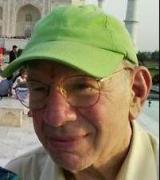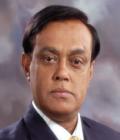Creation and Criticism
ISSN: 2455-9687
(A Quarterly International Peer-reviewed Refereed e-Journal
Devoted to English Language and Literature)
Vol. 07, Joint Issue 24 & 25: Jan-April 2022

Interview
The Making of An Indian Nationalist
"Subhas Chandra Bose was a Wandering Bird" — Jonah Raskin
Jonah Raskin : In Conversation with Nibir K. Ghosh
Jonah Raskin, former chair of the Communication Studies Department at Sonoma State University, U.S.A., is the author of fourteen major books that include: The Mythology of Imperialism: Joyce Cary, E.M. Forster, Joseph Conrad, Rudyard Kipling, D.H. Lawrence (1971); Out of the Whale: Growing Up in the American Left (1973); Underground (1978); My Search for B. Traven (1980); For the Hell of It: The Life and Times of Abbie Hoffman (1996) and American Scream: Allen Ginsberg's ‘Howl’ and The Making of the Beat Generation (2004). In the late 1960s, he taught English and American literature at the State University of New York at Stony Brook and for most of the 1970s he worked as a reporter, a journalist and an editor at University Review, a monthly magazine of politics and the arts. As a Fulbright Professor in Belgium, he taught American literature at the University of Antwerp and the University of Ghent. He is now writing a memoir about his life in California and a literary biography of Jack London. He serves on the advisory board of Re-Markings and is a regular contributor to the journal. In this conversation Jonah Raskin shares his impressions of Subhas Chandra Bose as an icon of India’s freedom endowed with sterling qualities of sacrifice and leadership.
Nibir: You’re not Indian, or South Asian, so why are you interested in Bose?
Jonah: First of all, everything I know about Bose I have learned from Re-Markings and through my connections with you. I knew nothing about him before publication of the special issue of Re-Markings about Bose. That was my ignorance. I am grateful to the journal for bringing Bose to my attention. I know that I am drawn to individuals who have been excluded from the official stories. Bose is one of them. Books about Indian independence mostly focus on Gandhi and on Nehru and on the Indian National Congress. They have mostly excluded Bose. By reading about and studying the life and work of Bose we can get a much fuller picture of the Indian anti-colonial movement, and fuller pictures are usually better than narrower pictures. There are still tremendous hurdles in the way of freedom and equality. It helps to know all the various strategies that human beings have used in the past to seek the end of tyranny and oppression and inequality.
Nibir: What strikes you about his biography?
Jonah: For one thing what strikes me is that he was born at the very end of the nineteenth-century and died in 1945, the year that the U.S. dropped nuclear bombs on Japan and the atomic age was born. Bose lived through a crucial time of twentieth-century history. When he was born in January 1897 the British Empire was near its height and the U.S. was rapidly becoming an imperial power. There were very big forces arrayed against him, but he didn’t let them daunt him. He didn’t give up his dream of an independent India. There are also so many fascinating chapters in his life, including the chapter during World War II when he reached out to both Germany and Japan in an effort to win Indian freedom from English imperialism. He was willing to make very difficult and controversial alliances. Hatred of the British Empire pushed him toward the very foes of that Empire. That was “gutsy,” as we’d say in the U.S.A. Then there was also his personal life, including his marriage to a European (i.e. a white) woman. Through he was a nationalist, he didn’t allow his nationalism to dictate who he should marry.
Nibir: In the Re-Markings’ Special Number, Bose: Immortal Legend of India’s Freedom, Ajit Mukherjee and Pranamita Pati have written that, “Subhas Bose remains a hard nut to crack.” Why do you think that is?
Jonah: I think he is a hard nut to crack because there were many different sides to him. Ajit Mukherjee & Pranamita Pati call Subhas Chandra Bose “a visionary spiritualist.” He was also a statesman, a trade union leader, a military strategist and more. Bose was many different individuals all wrapped up in one person. He was drawn to both Communism and to the ideology of national socialism and today, I think, it’s challenging for many people to understand why he would want to meet with Hitler in 1942 and also with the Japanese Prime Minister Hideki Tojo in 1943 and why he admired the Soviet Union under Stalin. That’s a hard sell to liberals and pacifists and foes of violence. Of course, he also met with people in the British Labor Party.
Nibir: You have written that “Love” was very important to Bose. Can you say more?
Jonah: I was struck by the fact that he wrote in “My Faith, Philosophical” that “The essential nature of reality is LOVE.” For emphasis he capitalized the word love. He added that, “LOVE is the essence of the Universe and the essential principle of human life.” That’s remarkable in light of his resolute struggle against the British Empire. He must have loved the Indian people greatly. He risked his own life to achieve Indian independence and didn’t stay at home with his wife and drink tea and hold hands and kiss.
Nibir: You’ve also said that he was a poet. What do you mean by that?
Jonah: He was a deep thinker, but he also used poetic language. He had what I’d call a tender side as well as a hard side. He called himself a “wandering bird” and an “iceberg.” He did quite a lot of traveling and must have felt like a migrating bird. But in order to do the work he did he surely had to steel himself and be as cold as an iceberg. Maybe the iceberg image also reflects the fact that much of his personality was submerged and not visible. He had to be secretive some of the time.
Nibir: Looking at Bose’s life what does it say about World War II?
Jonah: It says how difficult it was to maintain a moral position and take the higher ground. Nobody was pure. Stalin signed a “non-aggression” pact with Hitler. Some of the Brits wanted the Germans and the Russians to destroy one another. They weren’t troubled that millions of Russians died on the Eastern Front. The U.S. totally destroyed the German city of Dresden and used nuclear weapons against Japan, while the Germans had their concentration camps and exterminated Jews, Communists, homosexuals, and anyone they didn’t like. In the U.S. the government of President Roosevelt, rounded up almost all the Japanese in California and put them in detention centers. What a horrible time in history! Many Americans I know think things are worse now than ever before. They don’t remember or have forgotten or never bothered to learn about Dachau, Hiroshima, Stalingrad, or the fact that the British banned Bose’s book, The Indian Struggle and put him in prison. In World War II, a total war, a lot of books and movies were banned. Censorship was alive and well. The Irish probably hated the British as much as the Indians and some of them weren’t willing to help the Brits defeat the Nazis. The Irish declared neutrality during World War II.
Nibir: Why Bose now? What does he have to say to the world in 2019?
Jonah: That is a very good question. I think that it’s important to be single-minded if you want to achieve something worthwhile, and at the same time to be willing to make all kinds of alliances to meet your goal. Today that goal might be getting a handle on climate change which is going to impact everyone on the Earth, if it hasn’t already, and to get all human beings to play their part. I personally am not good at making alliances with individuals whose politics I disapprove of. But alliances are essential. You can’t be a purist about everything and you can’t fight every battle, so you have to pick the most important battles and give your all. I’d also say that we might look at the world today and see how important thinkers and doers have been marginalized and ignored. Is there a Bose today? Maybe so! I take that back. There is surely at least one Bose out there today. Thank you for the opportunity to share my views of Bose.
 The Interviewer:
The Interviewer:
Dr. Nibir K. Ghosh, D.Litt., is UGC Emeritus Professor at Agra College, Agra. Author/Editor of 15 acclaimed books, he has been Senior Fulbright Fellow at the University of Washington, Seattle, USA during 2003-04. He is founder Chief Editor of Re-Markings, a refereed international biannual journal of English Letters, that has recently celebrated the 21st birth anniversary of its publication.
.


